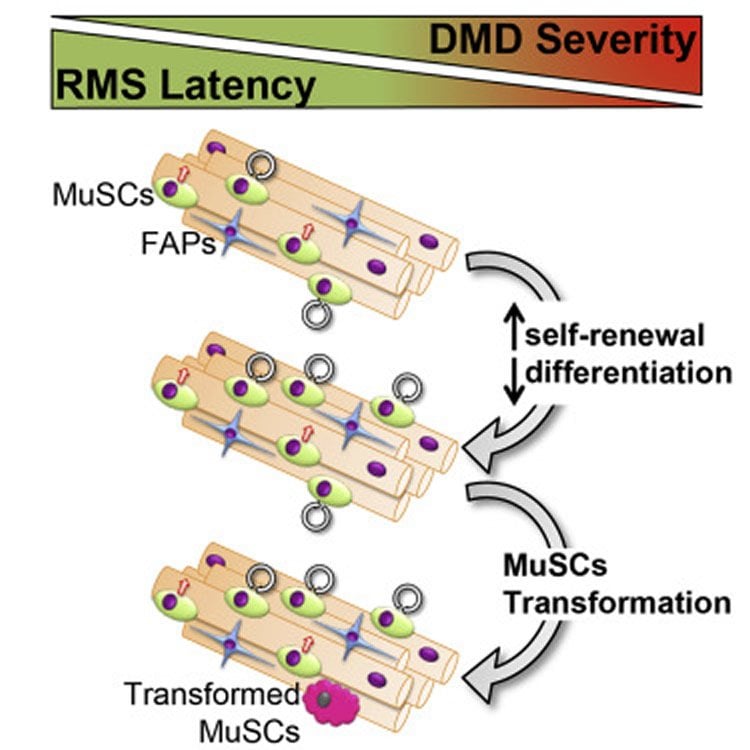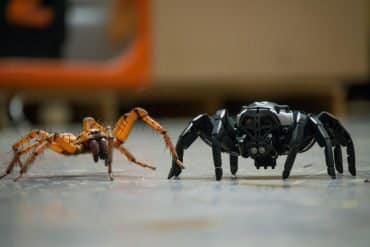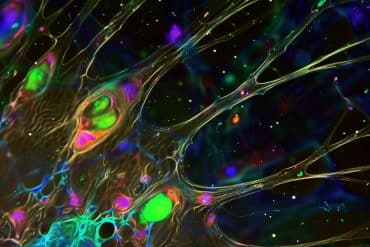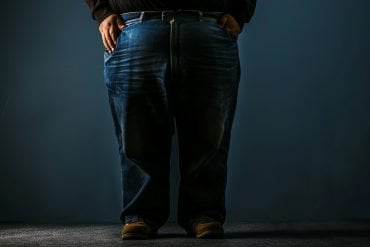Summary: Researchers report muscle stem cells may give rise to rhabdomyosarcoma, a rare cancer that affects the muscles in Duchenne muscular dystrophy. The study also identifies two genes linked to the tumor’s growth.
Source: SBP.
People with Duchenne muscular dystrophy (DMD) can develop an otherwise-rare muscle cancer, called rhabdomyosarcoma, due to the muscle cells’ continuous work to rebuild the damaged tissue. However, little is known about how the cancer arises, hindering development of a treatment or test that could predict cancer risk.
Now, scientists from Sanford Burnham Prebys Medical Discovery Institute (SBP) have demonstrated that muscle stem cells may give rise to rhabdomyosarcoma that occurs during DMD–and identified two genes linked to the tumor’s growth. The research, performed using a mouse model of severe DMD, helps scientists better understand how rhabdomyosarcoma develops in DMD–and indicates that ongoing efforts to develop treatments that stimulate muscle stem cells should consider potential cancer risk. The study was published in Cell Reports on January 15, 2019.
“Scientists, including our team, are interested in harnessing muscle stem cells’ inherent power to generate new muscle tissue to treat DMD. Thus, understanding the cell’s behavior during disease is important so we know how to use the cells most effectively,” says Alessandra Sacco, Ph.D., senior author of the paper and associate professor in the Development, Aging and Regeneration Program at SBP. “In addition to deepening our understanding of how this cancer may occur in DMD, our findings highlight the importance of careful assessment of muscle stem cells’ health when developing potential DMD treatments.”
DMD is a genetic condition caused by a lack of dystrophin, a protein that strengthens muscles. The condition causes progressive muscle degeneration and primarily affects boys, with symptoms often beginning between the ages of 3 and 5. With recent medical advances, children with DMD are now surviving beyond their teenage years into their early 30s, but effective treatments are still needed.
In the study, the scientists found that mice with more severe DMD developed rhabdomyosarcoma sooner, indicating that increased muscle degeneration promotes cancer development. Next, they isolated several cells involved in muscle regeneration from mice with severe DMD and tested their ability to become tumors. In contrast to the other cells, muscle stem cells had an increased ability to replicate (self-renew) and formed tumors when grown independently. The muscle stem cells also showed early signs they would develop into tumors, including increased self-renewal, accumulation of DNA damage and gene expression patterns similar to those seen in human rhabdomyosarcoma.

Using RNA sequencing, the scientists also identified two genes associated with the tumor’s growth, Ccl11 and Rgs5, which are involved in inflammation and wound healing. When the scientists added Ccl11 and Rgs5 proteins to tumor cells, it reduced their growth–indicating these genes are involved in the growth of the cancer.
“As a next step, we’d like to further elucidate how exactly these two genes are supporting tumor growth,” says Sacco. “This research might yield molecular targets that could lead to treatments for rhabdomyosarcoma in DMD.”
Funding: The study was funded by the Ellison Medical Foundation, Glenn Foundation for Medical Research Award, National Institutes of Health.
Source: Susan Gammon – SBP
Publisher: Organized by NeuroscienceNews.com.
Image Source: NeuroscienceNews.com image is credited to Sacco et al./Cell Reports.
Original Research: Open access research for “Muscle Stem Cells Give Rise to Rhabdomyosarcomas in a Severe Mouse Model of Duchenne Muscular Dystrophy” by Francesca Boscolo Sesillo, David Fox, and Alessandra Sacco in Cell Reports. Published January 14 2019.
doi:10.1016/j.celrep.2018.12.089
[cbtabs][cbtab title=”MLA”]SBP”Muscle Stem Cells Can Drive Cancer that Arises in Duchenne Muscular Dystrophy.” NeuroscienceNews. NeuroscienceNews, 15 January 2019.
<https://neurosciencenews.com/duchenne-cancer-10552/>.[/cbtab][cbtab title=”APA”]SBP(2019, January 15). Muscle Stem Cells Can Drive Cancer that Arises in Duchenne Muscular Dystrophy. NeuroscienceNews. Retrieved January 15, 2019 from https://neurosciencenews.com/duchenne-cancer-10552/[/cbtab][cbtab title=”Chicago”]SBP”Muscle Stem Cells Can Drive Cancer that Arises in Duchenne Muscular Dystrophy.” https://neurosciencenews.com/duchenne-cancer-10552/ (accessed January 15, 2019).[/cbtab][/cbtabs]
Abstract
Muscle Stem Cells Give Rise to Rhabdomyosarcomas in a Severe Mouse Model of Duchenne Muscular Dystrophy
Most human cancers originate from high-turnover tissues, while low-proliferating tissues, like skeletal muscle, exhibit a lower incidence of tumor development. In Duchenne muscular dystrophy (DMD), which induces increased skeletal muscle regeneration, tumor incidence is increased. Rhabdomyosarcomas (RMSs), a rare and aggressive type of soft tissue sarcoma, can develop in this context, but the impact of DMD severity on RMS development and its cell of origin are poorly understood. Here, we show that RMS latency is affected by DMD severity and that muscle stem cells (MuSCs) can give rise to RMS in dystrophic mice. We report that even before tumor formation, MuSCs exhibit increased self-renewal and an expression signature associated with RMSs. These cells can form tumorspheres in vitro and give rise to RMSs in vivo. Finally, we show that the inflammatory genes Ccl11 and Rgs5 are involved in RMS growth. Together, our results show that DMD severity drives MuSC-mediated RMS development.






